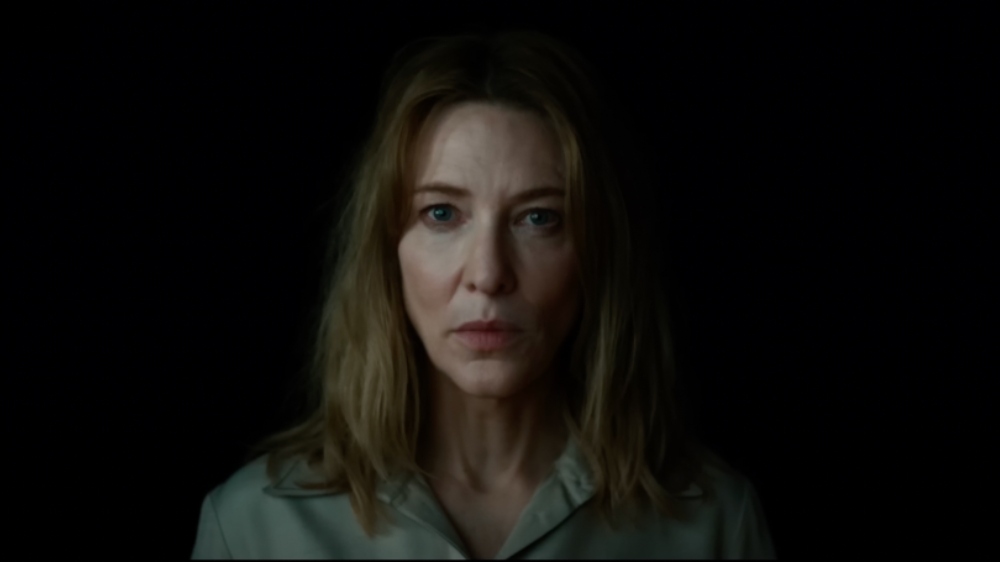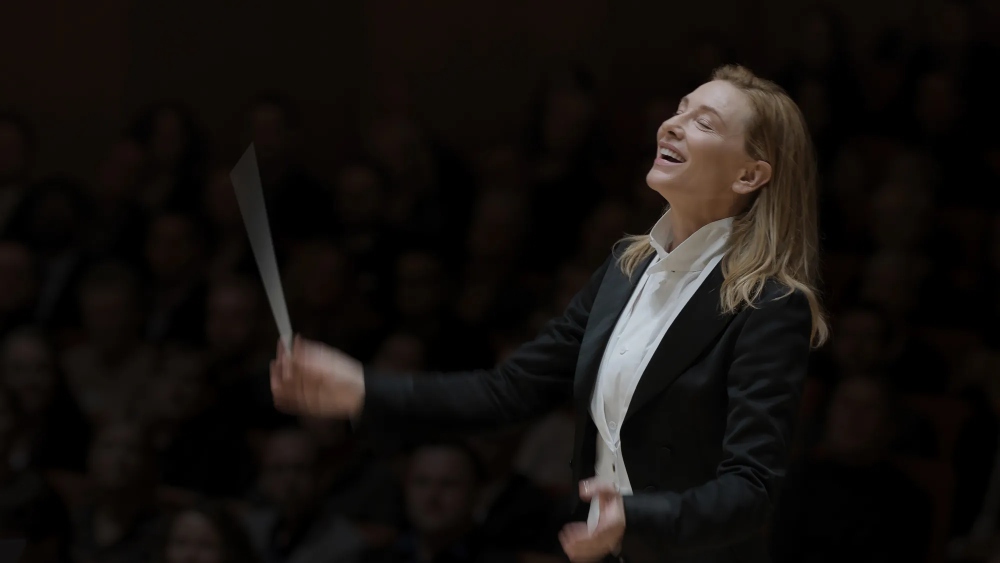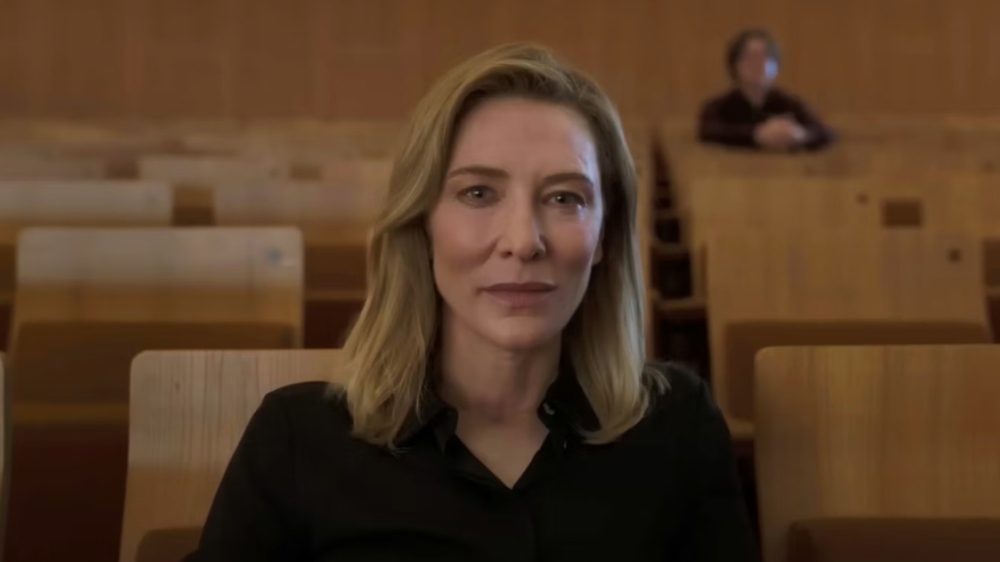
Two-thirds of the way through the 160-minute runtime of Cate Blanchett’s new festival vehicle Tár, the titular protagonist Lydia Tár is seen with her face bloodied, her eye swollen, and her nose broken. She is battered because of an excursion gone wrong, but that is beside the point — these broken features are emblematic of what is required to reach the pinnacle of success in most industries, particularly for women, and of what Tár herself has had to do to get there. She is not a boxer (in fact, she’s the conductor of the Berlin Orchestra) but she may as well be, because the metaphysical punches come at her from every direction, and she can throw a mean one herself. By the end of the epic runtime, you are left mesmerized that an actress already seemingly at the top of her game could scale an even higher peak. The film, essentially pitch-perfect but for a terribly meandering final 20 minutes, serves primarily as a vehicle for Blanchett to show off what may be reaching an “unequable prowess” level of acting.
Tár serves as Todd Field’s (In the Bedroom, Little Children) first film in 16 years, and when it begins, Lydia is about to take the stage for an interview with The New Yorker. The moderator’s intro establishes Lydia as an EGOT winner, an accomplished humanitarian, and the greatest conductor this side of Leonard Bernstein (who also happened to tutor her). Backstage, as she prepares to go on, Lydia goes through a series of facial tics, hand movements, and sharp breaths — perhaps superstitious rituals, perhaps necessary habits — that make her ready to prowl and pounce on her questioner when she begins.
Later, Lydia flies back to her second home in Berlin, where she lives with her wife Sharon (Nina Hoss) and bosses around her bleary-eyed assistant Francesca (Noemie Merlant), a sadder, more tragic version of Anne Hathaway’s Andy in The Devil Wears Prada. Lydia has to parry the unwelcome accusations of a conceited investment banker (Mark Strong) and prepare for a majestic return to in-person, post-COVID performances while dealing with an aging first executive conductor (played by Allan Corduner) and a sexy new cellist from Russia named Krista (Sylvia Flote).

Lydia goes about her day taking no prisoners (threatening her daughter’s would-be bully at school, for example), all the while plotting, scheming, and snarling — things that have gotten her to the top, and of which she is visibly proud. Through it all, Blanchett guides us, her profound performance both confident and convincing. From the very first opening sequence in which the New Yorker interviews Lydia, Blanchett — who received the Silver Medallion at Telluride — has created an entirely new character from scratch and fully inhabited her to the point where you may just be convinced that you’re watching a real person and not an actress. She’s that mesmerizing in the role, and Field is well aware of the talent he’s working with her, making sure that the camera stays on her as much as possible.
Hildur Guonadottir, who also composed the score for Telluride’s Women Talking, wrote the music for this film as well, showing off her range and the varied nature of her talent. While her work in Sarah Polley’s film illustrated both tenderness and a sense of danger, here, her cymbals are stronger, her drums more persistent, and the piano ever present, as she weaves together this cacophony of sound while Lydia conducts from atop her podium, where she is, after all, conducting an orchestra as they play selections from some of the great classical musicians. Guonadottir combats their older (but still grand) tones as they interact with her characteristically modern tunes. Her Women Talking score will likely garner awards attention, but this one is better.
Kudos are reserved for two other below-the-line talents — Production Designer Marco Bittner Rosser and Costume Designer Bina Daigeler. Rosser found a real-life apartment in Berlin that is mostly steel and cement, with triple-height ceilings, stainless steel kitchens, and labyrinthine corridors that evoke Lydia’s consciousness, her power, her cold convictions, and her soul. You want her to come back home to this apartment because, as retrofitted by Rosser, it is the coolest and most interesting living space in a 2022 release thus far. Daigeler’s efforts are equally impressive and easy to overlook, as she dresses Blanchett’s Lydia in modern, contemporary European looks while maintaining the style of a successful, powerful woman who is both disinterested in and painfully aware that she is being judged by what she wears.

In addition to being an acting clinic, Tár makes some fine points about power, ambition, and success, while touching upon cancel culture and how pride cometh before the fall. If it were not for the rambling 20-minute homestretch that mirrors Lydia’s downward spiral and mars the ending of the film, this would be one of the most original, effective, and bold movies in a long while.
In one early scene, Lydia faces off against a BIPOC student who identifies as gender-fluid during a Julliard teaching stint. The student pushes back on Lydia’s questions regarding which of the great composers they are interested in, by noting he is not interested in work by cisgender white males such as Beethoven and Mozart. Lydia pushes back, in turn, stating her theory that there is little relationship between talent and identity. Eventually, the student calls her a “bitch” and she counters by saying he’s a robot whose ideas come from a sheep-like online app. Later still, during a conversation with a much older gentleman who preceded her as a composer, Lydia decries the current culture of being adjudged guilty after being accused of any perceived wrongdoing, and during the New Yorker interview, she rejects the notion of being seen as a “female composer” or a “female” anything, as she prefers to think of herself as, simply, a “composer.”
These are, of course, the hardest themes for Tár to sell to modern audiences. Field’s original screenplay explores the old notion that for women to be successful, they have to be tougher, meaner, and harsher than men, and then get unfairly decried for it. To this old notion, it marries the common modern phenomenon of “one strike and you’re gone,” where the combined cacophony of the internet and society’s self-appointed cultural guardians can get even the most successful among us — even those nominally on the same “side” — thrown out on their behinds. The result, as per Tár, is a toxic, almost impossible combination that ironically serves to bring down not just heroes, but heroines. The film leaves it up to the viewer to determine whether they think Lydia is ultimately deserving of her fate or not, which is in and of itself subversive during a time in which easier, cleaner answers are much preferred.
By the time the credits roll (they actually roll both as Tár opens and when it ends), you’ll be left with the uneasy conviction that you have just witnessed something both undeniably original and terribly uncomfortable. Suffused with one of those timeless performances by a timeless actress, a quiet yet thundering score, and a series of uncomfortable, unanswered questions, Tár is one of those rare films that is both satisfying and frustrating. In short, it is virtually guaranteed to be divisive, and that’s a good thing, indeed.
Grade: A-
Tár played at the Venice and Telluride Film Festivals and will be released in U.S. theaters on Nov. 18 by Focus Features.





